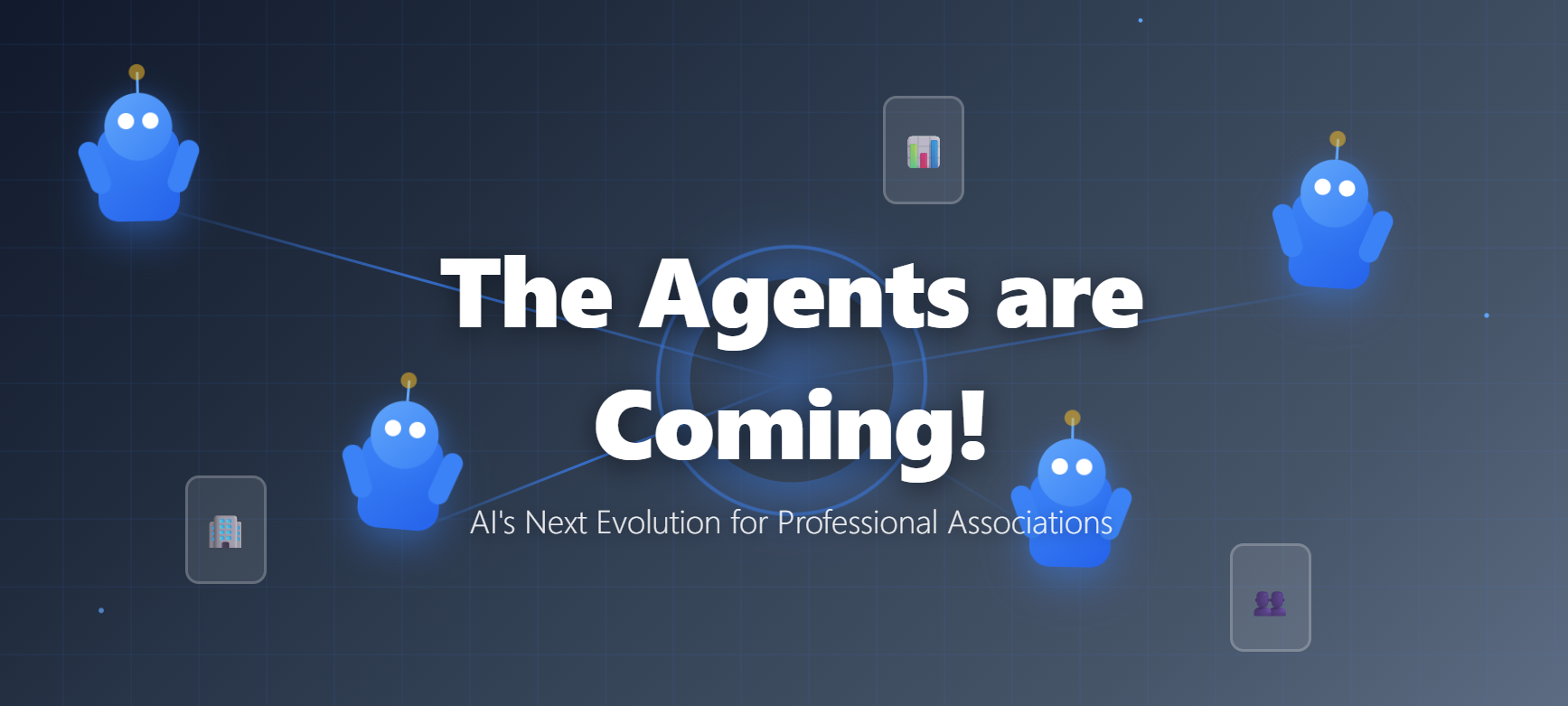The Agents are Coming!

A Professional Association Leader's Guide to the AI Revolution's Next Chapter
Remember when we thought chatbots were revolutionary? Well, buckle up, because AI is about to get a serious promotion. While we've been getting comfortable with ChatGPT and its cousins helping us draft emails and brainstorm ideas, a new wave of AI technology is preparing to fundamentally transform how work gets done. Say hello to AI agents—and yes, they're coming to an association near you.
What Exactly Are AI Agents?
Think of AI agents as the difference between having a brilliant intern who can answer questions versus having a seasoned executive assistant who can actually do things on your behalf. An artificial intelligence (AI) agent refers to a system or program that is capable of autonomously performing tasks on behalf of a user or another system by designing its workflow and utilizing available tools.
Unlike traditional chatbots that wait for your prompt and respond with text, AI agents can:
- Make decisions based on complex information
- Execute multi-step workflows independently
- Interact with various software systems and tools
- Learn from their experiences and adapt their approach
- Work toward specific goals with minimal supervision
To put it in association terms: imagine an AI that doesn't just tell you how to plan your annual conference but actually coordinates with venues, manages speaker communications, tracks registration numbers, adjusts marketing campaigns based on performance, and alerts you only when executive decisions are needed. That's the promise of AI agents.
How Do These Digital Workers Actually Work?
Without diving too deep into the technical weeds (we'll leave that to the IT department), here's the simplified version of how AI agents operate:
1. Perception and Understanding
AI agents start by gathering information from their environment—whether that's reading emails, analyzing databases, monitoring social media, or tracking member engagement metrics. They use advanced language models to understand context and meaning, not just keywords.
2. Planning and Reasoning
The advent of reasoning capabilities represents the next big leap forward for AI. Reasoning enhances AI's capacity for complex decision making, allowing models to move beyond basic comprehension to nuanced understanding and the ability to create step-by-step plans to achieve goals. This means agents can break down complex tasks into manageable steps and determine the best approach.
3. Action and Execution
Here's where agents differ dramatically from chatbots. They don't just suggest actions—they take them. Using APIs and integrations, agents can update databases, send communications, schedule meetings, generate reports, and interact with multiple systems simultaneously.
4. Learning and Adaptation
Through feedback loops and outcome analysis, agents refine their approaches over time. They learn which strategies work best for your specific organization and member base.
Think of it as having a highly capable assistant who never sleeps, never forgets, and gets smarter every day—though one that still needs clear boundaries and human oversight.
The Ethics Question: With Great Power Comes Great Responsibility
Now for the elephant in the room: the ethical implications of unleashing autonomous AI systems in our organizations. Because AI agents can act without your supervision, there are a lot of additional trust issues compared to traditional AI tools.
Key Ethical Considerations for Association Leaders:
1. Transparency and Disclosure
AI ethics expert Stuart Russell has long advocated for mandatory disclosure of AI interaction. Your members have a right to know when they're interacting with an AI agent versus a human staff member. While some organizations adopt a "don't ask, don't tell" approach, best practices lean toward proactive disclosure.
2. Decision-Making Authority
How much autonomy should an AI agent have? Can it approve membership applications? Send official communications? Make financial decisions? Establishing clear ethical guidelines that prioritize human rights, privacy and accountability is an essential measure to ensure that AI agents make decisions that are aligned with human and societal values.
3. Data Privacy and Security
AI agents need access to data to function effectively, but this raises serious privacy concerns. With member information, financial data, and strategic plans at stake, robust data governance isn't optional—it's essential.
4. Job Displacement and Human Dignity
If human workers perceive AI agents as being better at doing their jobs than they are, they could experience a decline in their self-worth. The goal should be augmentation, not replacement. We should empower staff to decide how they want to leverage agents, but not necessarily replacing them in every single situation.
5. Bias and Fairness
AI agents can inadvertently perpetuate or amplify biases present in their training data. For associations committed to diversity, equity, and inclusion, ensuring fair treatment across all member interactions is crucial.
Implementing Ethical Safeguards:
Implementing "human-in-the-loop" oversight, enabling agents to work autonomously while human experts review decisions is one practical approach. Think of it as having AI agents prepare recommendations and execute routine tasks while humans retain veto power and handle sensitive decisions.
Organizations should also establish clear policies around:
- What tasks AI agents can and cannot perform
- Required disclosure protocols for AI interactions
- Data access limitations and security measures
- Regular audits for bias and performance
- Clear accountability chains for AI-driven decisions
The Road Ahead: Preparing Your Association
By 2027, half of companies that use genAI will have launched 'agentic AI' according to Deloitte. The question isn't whether AI agents will impact your association, but how prepared you'll be when they do.
Here's your action plan:
Start Small: Begin with low-risk, high-repetition tasks like initial member inquiries or event registration processing.
Invest in Education: Ensure your board and staff understand both the capabilities and limitations of AI agents.
Develop Policies Now: Don't wait for an incident to establish ethical guidelines and governance structures.
Focus on Augmentation: A prevailing vision of agentic adoption over the next year is one which sees agents augmenting, but not necessarily replacing, human workers.
Monitor and Iterate: As greater agency means more autonomy and therefore less human interaction, continuous monitoring becomes even more critical.
Conclusion: Embrace the Future, Thoughtfully
AI agents represent a fundamental shift in how associations can serve their members and achieve their missions. They offer unprecedented opportunities for efficiency, personalization, and scale. But with these opportunities come responsibilities that we cannot afford to ignore.
The agents are indeed coming—in fact, they're already here in early forms. The organizations that thrive will be those that thoughtfully integrate these powerful tools while maintaining their human touch and ethical standards. After all, associations are fundamentally about human connections and shared purpose. AI agents should enhance that mission, not replace it.
As you consider AI agents for your association, remember: the goal isn't to build the most sophisticated AI system. It's to build the right system for your members, your mission, and your values. The future of associations isn't human or AI—it's human and AI, working together toward common goals.
Ready or not, the agents are coming. The question is: how will you welcome them?
Word count: 1,190



